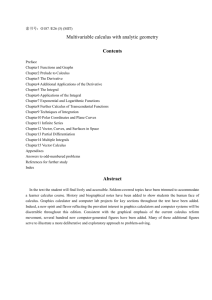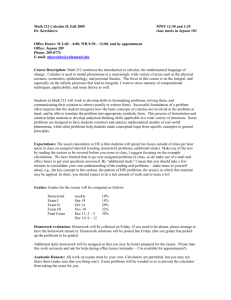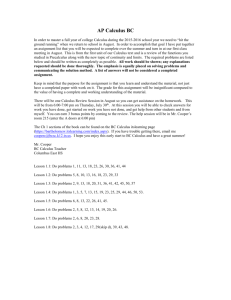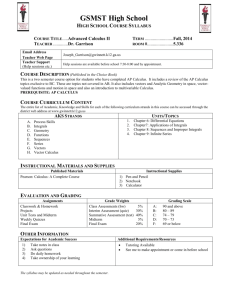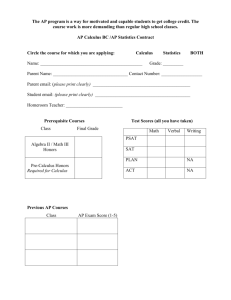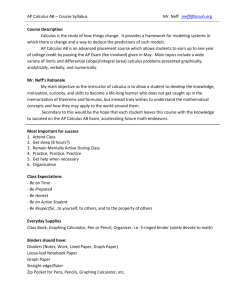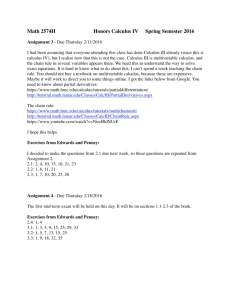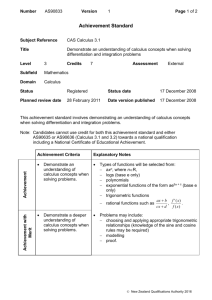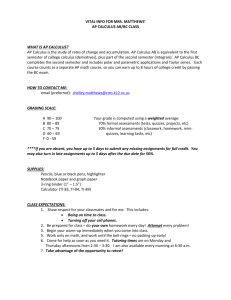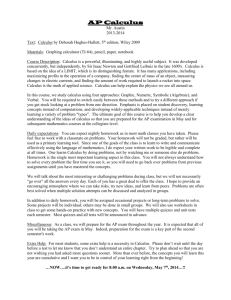The key to my success in Calculus II was composed of
advertisement
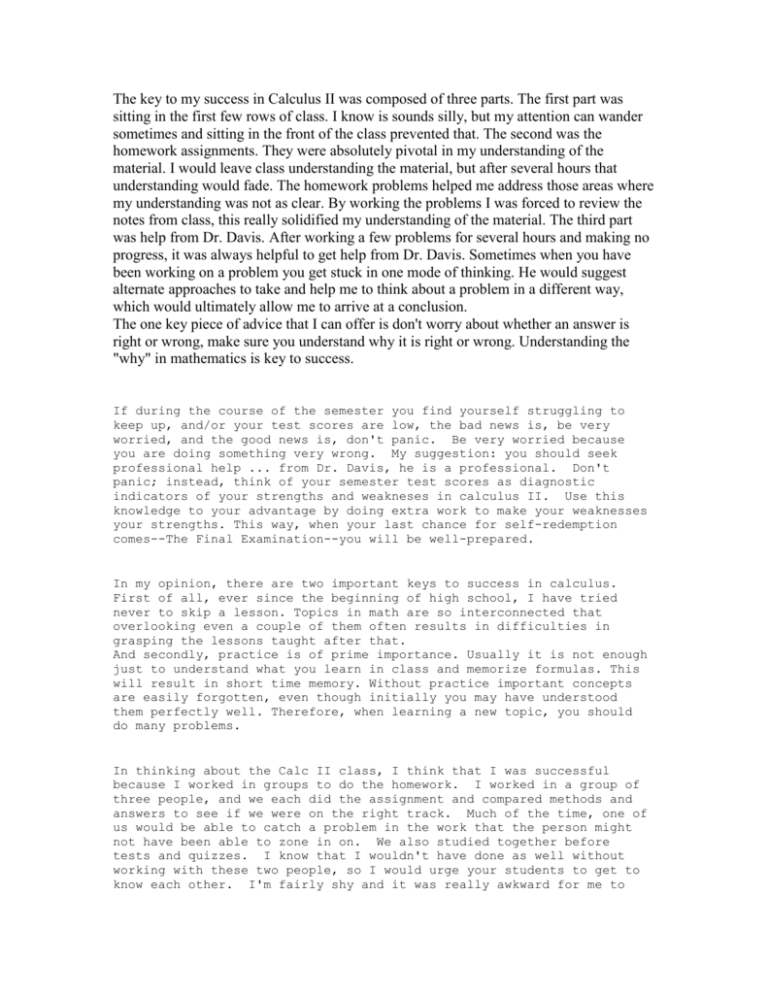
The key to my success in Calculus II was composed of three parts. The first part was sitting in the first few rows of class. I know is sounds silly, but my attention can wander sometimes and sitting in the front of the class prevented that. The second was the homework assignments. They were absolutely pivotal in my understanding of the material. I would leave class understanding the material, but after several hours that understanding would fade. The homework problems helped me address those areas where my understanding was not as clear. By working the problems I was forced to review the notes from class, this really solidified my understanding of the material. The third part was help from Dr. Davis. After working a few problems for several hours and making no progress, it was always helpful to get help from Dr. Davis. Sometimes when you have been working on a problem you get stuck in one mode of thinking. He would suggest alternate approaches to take and help me to think about a problem in a different way, which would ultimately allow me to arrive at a conclusion. The one key piece of advice that I can offer is don't worry about whether an answer is right or wrong, make sure you understand why it is right or wrong. Understanding the "why" in mathematics is key to success. If during the course of the semester you find yourself struggling to keep up, and/or your test scores are low, the bad news is, be very worried, and the good news is, don't panic. Be very worried because you are doing something very wrong. My suggestion: you should seek professional help ... from Dr. Davis, he is a professional. Don't panic; instead, think of your semester test scores as diagnostic indicators of your strengths and weakneses in calculus II. Use this knowledge to your advantage by doing extra work to make your weaknesses your strengths. This way, when your last chance for self-redemption comes--The Final Examination--you will be well-prepared. In my opinion, there are two important keys to success in calculus. First of all, ever since the beginning of high school, I have tried never to skip a lesson. Topics in math are so interconnected that overlooking even a couple of them often results in difficulties in grasping the lessons taught after that. And secondly, practice is of prime importance. Usually it is not enough just to understand what you learn in class and memorize formulas. This will result in short time memory. Without practice important concepts are easily forgotten, even though initially you may have understood them perfectly well. Therefore, when learning a new topic, you should do many problems. In thinking about the Calc II class, I think that I was successful because I worked in groups to do the homework. I worked in a group of three people, and we each did the assignment and compared methods and answers to see if we were on the right track. Much of the time, one of us would be able to catch a problem in the work that the person might not have been able to zone in on. We also studied together before tests and quizzes. I know that I wouldn't have done as well without working with these two people, so I would urge your students to get to know each other. I'm fairly shy and it was really awkward for me to work with two strangers, but because one of them approached me, I was able to get a good relationship going and we ended up helping each other out a lot. I think it was also helpful that I reviewed each day what we had gone over that day in class just so that it wouldn't completely leave me if I waited until the next day to do the homework assignment. I think it also helps a lot to have a designated "math" time to work so that it is the only thing that you are focusing on. Whereas with other courses and subjects, I can switch back and forth between the work, I find that for math it helps me to be in one "math zone" to really be able to focus. I would say approaching math with a positive attitude is the first step toward success in math. In my opinion, there is no such thing as innumeracy or a lack of talent for math. Just like with any other subject, math is a skill that takes time to develop. The more you use and think about math, the more facile it becomes. If you are not very comfortable with calculus, reviewing basic algebra is a good start. Of the student I have helped, most of them encounter problems in calculus because they have forgotten the basic concepts in algebra and geometry. So, learning the fundamentals might eliminate the fear for math. In approaching the class, I would spend about 20 minutes the night before the class previewing what we are going to learn. The more times I go over the material, the better I understand it. Especially, when I look at the material before it is taught and then go to class, I find that I understand the class lecture much better. During class, I find trying to copy down everything on the board doesn’t work for me. So, I focus all my energy in trying to understand the professor and the concepts being taught. I do not write down everything on the board but rather only the examples from which I get the best understanding of the concept. Listening is very important, often, professors summarize concepts while in class and those words are very helpful to me. Sometimes one or two sentences can elucidate an entire day’s lecture and in those situations, I take notes on those things. Thus, don’t waste too much energy on copying but rather focus on understanding and listening. After class, I try to spend about 30 minutes reviewing the concepts so as to not forget things too soon. I usually review before I start any homework because this saves a lot of going back to review notes during the homework. I never finish all the homework in one sitting but split it in two or three parts. I frequently skip the questions I cannot do and go back to retry these problems. Asking people in the same class is very helpful because I often find that they have the same problems. However, it’s easy to rely on them too much and homework should be completed independently. When preparing for the test, I advise starting at least three days before the test and preferably have a weekend to prepare. The examples in the book are very helpful and redoing problems in the book examples and the homework are beneficial. As for my "calculus II success", I guess the most important thing I did was that I would not fall behind in my work. I don't think I missed a single class, and if there was something I did not understand, I would try to clarify it immediately because I knew that the future topics would build up on the current concepts. I think the key for the best grade in your class was doing homework properly. By doing the homework I have learnt everything I needed. The second most important thing was to have a thoughtful review before each quiz or test. It was the best great help for each of the test.


